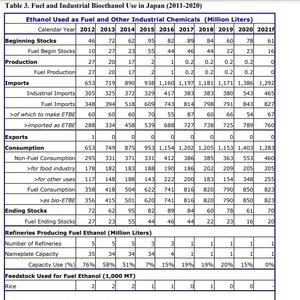Report: Japan's ethanol blend level averages 1.8% in 2021

January 5, 2022
BY Erin Krueger
Fuel ethanol consumption in Japan is expected to reach 823 million liters (217.41 million gallons) in 2021, down from 850 million liters in 2020, according to a report filed with the USDA Foreign Agricultural Service’s Global Agricultural Information Network in late December.
Japan currently has an ethanol blend mandate in place of 500 million liters of crude oil equivalent in the transportation sector, which is equivalent to approximately 823.7 million liters of ethanol. The mandate is fulfilled entirely the use of ethanol to produce bio-ethyl tert-butyl ether (ETBE), which is used as a gasoline additive.
Advertisement
Due to a fire incident at a bio-ETBE production facility in Texas in early 2019, Japanese ethanol consumption fell 34 million liters short of the mandate in 2019. Refineries were required to make up the shortage in 2020, when Japanese ethanol consumption reached 850 million liters. Imported bio-ETBE represented approximately 94 percent of 2020 ethanol consumption, according to the GAIN report. Approximately 6 percent of bio-ETBE blended in 2020 was produced domestically with ethanol sourced from Brazil. A very small volume of bio-ETBE was made from domestically produced rice ethanol. Increased ethanol blending in 2020 combined with reduced fuel demand from the COVID-19 pandemic caused Japan’s ethanol blend rate to increase from 1.6 percent in 2019 to 1.9 percent in 2020.
As of September 2021, the report notes that imports of bio-ETBE and ethanol were on track to reach the required mandate targets, with current forecasts predicting Japan’s transportation sector will consume 823 million liters of ethanol in 2021. The ethanol blend rate is expected to average 1.8 percent in 2021.
Advertisement
According to the GAIN report, Japan currently has only one domestic ethanol refinery. That facility operated at 15 percent capacity in 2020 but was expected to remain idle throughout 2021.
Total ethanol consumption in Japan for all uses is expected to reach 1.283 billion liters in 2021, down from 1.403 billion liters in 2020. The report notes that as of October 2021, the U.S. had not exported ethanol directly to Japan for fuel. Direct U.S. ethanol exports are destined for industrial use and first shipped to bonded warehouses in South Korea, according to the report. As a result, substantial differences exist between U.S. export trade data and Japan’s import data for ethanol.
A full copy of the report can be downloaded from the USDA FAS GAIN website.
Related Stories
CountryMark on July 22 celebrated the completion of more than $100 million in upgrades at its refinery in Indiana, including those related to soybean oil storage. The facility produces renewable diesel via coprocessing technology.
ATOBA Energy and Air Moana are partnering to implement scalable solutions for the supply of SAF. The collaboration aims to ensure long-term SAF availability while supporting local initiatives to develop sustainable fuel production in Tahiti.
Neste Corp. on July 24 released second quarter results, reporting record quarterly renewable product sales volumes despite weaker margins. SAF sales were up nearly 80% when compared to the first quarter of 2025.
Valero Energy Corp. on July 24 released second quarter results, reporting a profitable three-month period for its ethanol segment. The renewable diesel segment posted a loss, but the company’s new sustainable aviation fuel (SAF) unit operated well.
The IRS on July 21 published a notice announcing the 2025 calendar-year inflation adjustment factor for the Section 45Z clen fuel production credit. The resulting adjustment boosts maximum the value of the credit by approximately 6%.
Upcoming Events










